Premium
From humble beginnings to stardom: How Henry Rono made a name for himself
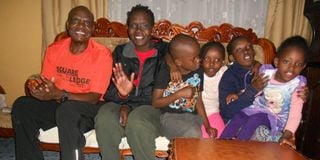
Henry Rono (left), his daughter Maureen Rono and some of his grandchildren at his home in South C in December 2019 after his return from the US.
What you need to know:
- While many can marvel at Rono’s spectacular running career, few are aware of his troubled childhood.
- He had several challenges which only his close family members could come up with a solution.
As Kenyans give Henry Rono a final send-off at his Kirobon farm, Kuresoi North, Molo, Nakuru County, today, I look back at the time we spent together at his South C house, Nairobi after he returned to Kenya in 2019.
Our first meeting together with Steve Muchoki focused more on their historic performances.
Rono broke an unprecedented four world records in 81 days, while Muchoki became the first Kenyan and African to win the World Amateur Boxing flyweight title.
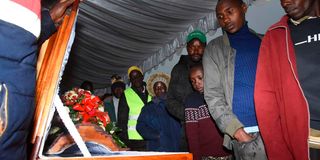
Mourners view the body of the late track legend Henry Rono at his home in Seguton village, Kuresoi South, Nakuru County, on February 27, 2024 after it arrived from Nairobi.
Both heroes achieved their feat in 1978 and Mzee Jomo Kenyatta, the first president of the Republic of Kenya decorated them with State Medals and gave directives that each be given eight grade cows, eight quality sheep or goats and a piece of land.
To date, the two have never received any of these presidential goodies.
Sadly, Rono will be buried without ever enjoying these gifts. It is hoped the current government will form a committee to look into the past mistreatment involving our sportsmen and women and make amends.
While many can marvel at Rono’s spectacular running career, few are aware of his troubled childhood.
Much as our discussions focused on how he wanted to settle back in Kenya happily with his family after 33 years in the United States.
He had several challenges which I believed only those family members close to him could come up with a solution. Once he was relaxed I asked him to tell me about his childhood.
Rono was born in 1952 in Kiptaragon, a village in Nandi Hills. At about two years old he was involved in a freak accident.
He fell off a bicycle ridden by his uncle in Turbo severely injuring his ankle. For many years after that, as other children his age grew stronger, and faster running in the fields, hills and forest of Nandi, he was only able to crawl.
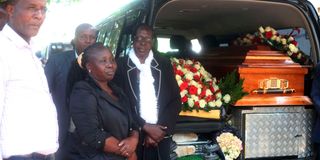
Former athlete Justina Chepchirchir (second right) and friends mourn with the late Henry Rono wife Jennifer Jepkemboi (right) in Nairobi on February 27, 2024 as they prepared to transport the body of the track legend to Nakuru.
He remembered his mother, Naum Jemaiyo, constantly asking herself and others, “Will he ever be able to walk again?”
He did, miraculously, several years later when he turned about six years old.
But even as he joined his mates in boundless running, the young Rono was again struck with another misfortune.
His father, Kimeli Rono, who was working on a tractor in a farm owned by a European was startled by a snake that had risen from the front wheel of the farm machine.
The senior Rono jumped back but landed awkwardly on a three-disc plough that fatally wounded him.
Rono’s father’s death came at a critical juncture in his upbringing. In Nandi culture, boys are raised primarily by their mothers, who teach them basic skills and values, until they are six years old.
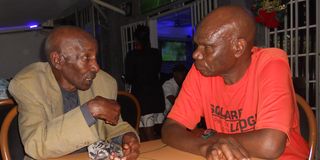
Henry Rono (right) with Steve Muchoki reflect on the good old days when they were both honoured by President Mzee Jomo Kenyatta a day before the Head of State's death on August 22, 1978.
After that, the boy’s father begins to play a more prominent role in raising him and teaching him how to become a man.
By the time a Nandi boy is 10, he is expected to assume a man’s responsibilities, which consist mostly of outdoor work, from hunting and working in the fields to looking after animals.
Without a father, his mother and grandmother stepped up to fill dual roles in his upbringing. Rono’s mother was raised by a Nandi warrior who died in World War One fighting for the British.
When the new independent Kenyan government declared free education to children of single parents, Rono got the chance to pursue a Certificate of Primary Education (CPE) as educating him would no longer be a financial burden to his mother.
Earlier, because her mother was not employed, going to school was out of the question for him. Rono worked as a herds boy, making Sh5 a month. His mother would be harassed for not taking him to school.
“We barely have enough to eat, so where would my mother find the money for school fees and uniforms?” he posed.
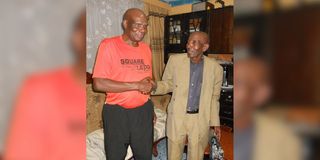
Legendary athlete the late Henry Rono (left) and with retired Kenyan boxer Steve Muchoki.
Rono said while the free education was a godsend to his mother, corrupt officials would still demand payment making it very tough for him to learn smoothly.
But the survivor he was, he rode through those challenges to become the pre-eminent athlete of his time.
He maintained his dignity and proved to the world that he was a rare talent with those four world records.
Only Henry Rono son of Kimeli, could achieve that feat.





